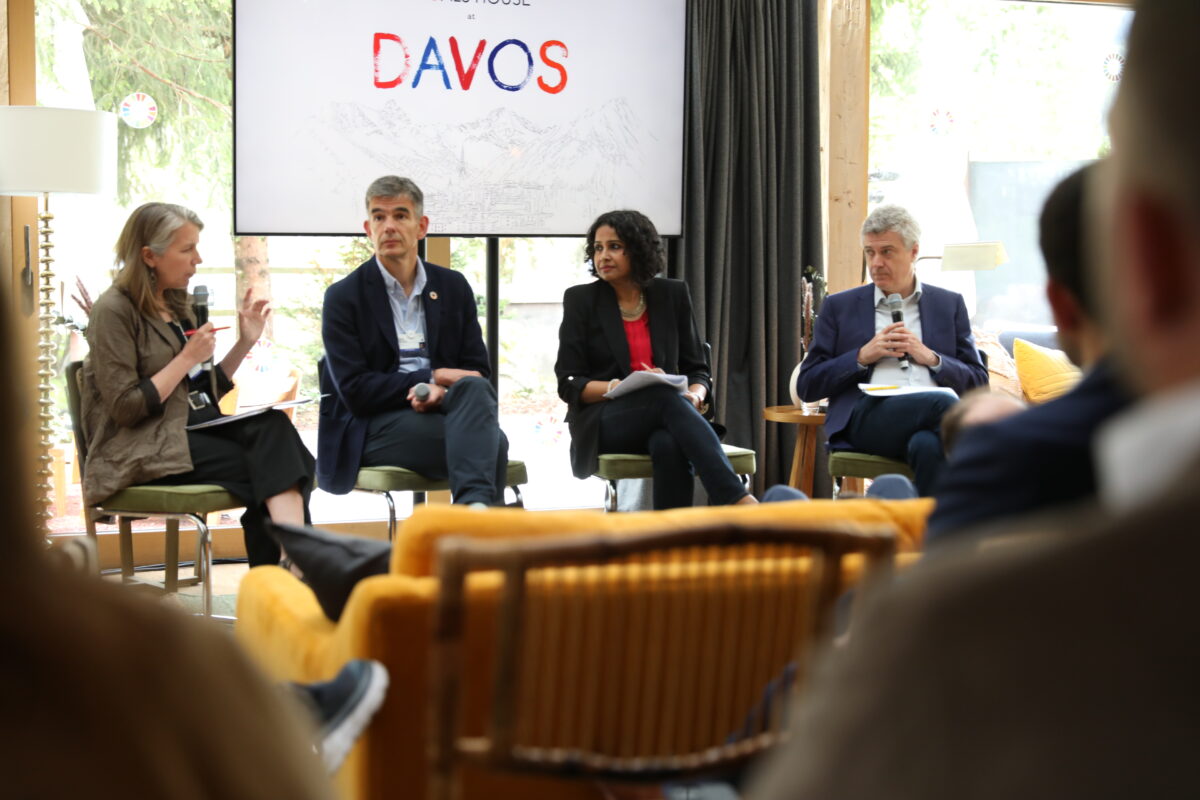
Independent media is fundamental to fostering freedom, vibrant economies, and productive civic debate. Yet, amid declining ad revenue and global economic shocks, trusted local news outlets face extinction. How can the public and private sectors — brands, big tech, and governments — help fundamentally improve the financial viability of news media and prevent democratic backsliding the world over?
Jeanne Bourgault, President and CEO of Internews, a nonprofit supporting independent media in over 100 countries, moderated a panel of business heavyweights at this year’s Davos conference. Panelists included Mark Read, WPP CEO; Matt Brittin, President of Europe, Middle East, and Africa for Google; and Asha Kharga, the Mahindra Group’s Chief Customer & Brand Officer.
The conversation covered key challenges to global media and democracy, as well as the obligation that businesses have — as one of the most trusted institutions globally — to support struggling local news media. Here are key takeaways from this timely discussion.
Democracy is a smart investment. In Ukraine, it’s both ethical and financially viable for businesses to combat Russian disinformation and help rebuild.
Russia’s invasion of Ukraine poses a threat to Ukrainian — and global — democracy. When asked whether major global brands have a job to do in Ukraine, WPP’s Mark Read said: “We have an obligation to help rebuild the country … it’s the right thing to do.”
Read explained that much of Ukraine’s economy is still functioning. With support, Ukraine’s vibrant and trusted independent media sector can continue delivering lifesaving information and combating Russian disinformation — good for business, good for people. “The worst thing we can do is mentally write off the country,” Read said.
Brands have a role to play in saving local news and democracy…
Ad budgets have progressively moved away from independent media, with disastrous consequences including news deserts and unchecked disinformation that feeds polarization, rising authoritarianism, unnecessary COVID deaths, and distrust in government. As Mahindra Group’s Asha Kharga said, local news is instrumental in bringing consumers the information they most need in their day-to-day lives. In fact, 69% of people say that they trust the content they see in local news brands. Advertisers should understand this: “Brands must go where consumers are, and that’s where local news is, supporting consumers,” Kharga said.
…and they can use their existing ad budgets to do it.
Local news offers advertisers benefits that are of increasing value in an era of short attention spans and high levels of distrust. Customers spend more time on local news pages, so they spend more time exposed to ads on those pages. Local news is more trusted even than national news, which translates to greater relevancy and “brand safety” for advertisers that appear in those venues.
Bourgault highlighted Internews’ Ads for News initiative, which offers country-based lists of trusted, independent, local news media that brands and their agencies target. This allows advertisers to reach a mass audience while buying from local media that report from the communities those advertisers sell into. Recently, WPP’s GroupM entered a Memorandum of Understanding with Internews targeting a percentage of its clients’ ad budgets in the Asia Pacific region toward its list of trusted, local news sources.
Transparency and accountability are key.
“We’re dealing with a rush of disinformation all the time, which we have to remove,” Google’s Matt Brittin says. “Who would have thought we’d need a policy clarifying that the pandemic wasn’t caused by 5G?” He went on to explain that big tech must work with brands, governments, and nonprofits to transparently vet information and provide consumers with facts to make informed decisions, especially during crises such as the war in Ukraine. By reducing the flood of disinformation, businesses help the quality, trustworthy information that local outlets produce break through the noise.
The session reaffirmed that local news is essential to democracy, both are under threat, and that major brands must be part of the solution. Through innovative approaches, such as applying ad spending to local outlets more intentionally, companies need not approach supporting local media as charity but rather a business and marketing opportunity.